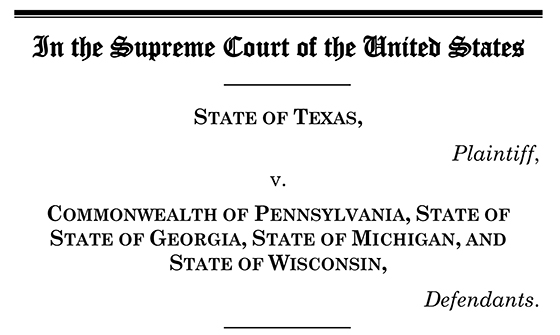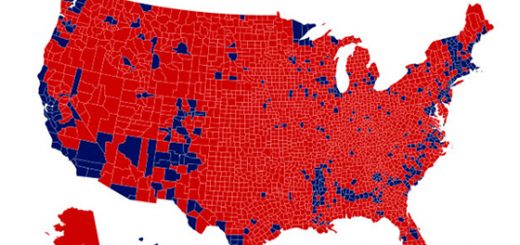The Texas suit is a very big deal.
There has yet been no satisfying outcome to the November 3 presidential election. And by ‘satisfying,’ we’re not talking about being happy as to who won and who lost. By ‘satisfying’ we mean having an outcome upon which both winners and losers can agree. Such satisfaction has been the hallmark of U.S. elections for most of its 231 years as a constitutional republic. Win or lose, American voters for the most part have always been able to rely on the results of our elections.
Such is not the case today. Assuming that Joe Biden hangs on to take the oath of office on January 20, he will do so with something approaching half the country believing that his ascendancy to the office is illegitimate. That does not bode well for his administration. It bodes less well for the future of the republic.
With that in mind, Texas Attorney General Ken Paxton has filed suit in the U.S. Supreme Court against the Commonwealth of Pennsylvania and against the states of Georgia, Wisconsin and Michigan. Democrats and the media have been quick to characterize the suit as a “Hail Mary” attempt to keep Donald Trump in office for a second term.
Nothing in the suit says that and in any event, it’s not about Donald Trump – something that attorneys general in 18 other states have apparently recognized as evidenced by the fact that they have joined the suit.
From a constitutional perspective, the Texas suit is a very big deal. Summarizing the suit takes more space than we have but let’s try to sort it out.
The case relies mostly on Article II, Section 1, Clause 2 of the Constitution – commonly referred to as the “Electors Clause.” That clause says:
[e]ach state shall appoint, in such manner as the Legislature thereof may direct, a number of electors, equal to the whole number of Senators and Representatives to which the State may be entitled in the Congress.”
The words, “as the Legislature thereof may direct” are key. The suit filed by Texas boils down to the objectively provable assertion that each of the four defendant states violated the election laws passed by their own legislatures. The complaint asserts that non-elected government officials, using the COVID pandemic as the justification, unconstitutionally waived or modified election laws that were duly enacted via state legislatures for the specific purpose of ensuring the integrity of each state’s electoral process. The suit says that such unconstitutional changes:
opened the door to election irregularities in various forms.”[snip] By waiving, lowering, and otherwise failing to follow the state statutory requirements for signature validation and other processes for ballot security, the entire body of such ballots is now constitutionally suspect and may not be legitimately used to determine allocation of the Defendant States’ presidential electors.”
Mail-in ballots are at the core of the problem. The hastily adopted changes to mail-in balloting procedures combined with, as the Texas suit says:
…Defendant States’ unconstitutional modification of statutory protections designed to ensure ballot integrity, Defendant States created a massive opportunity for fraud. In addition, the Defendant States have made it difficult or impossible to separate the constitutionally tainted mail-in ballots from all mail-in ballots.”
The suit then goes on to enumerate in great detail the ways in which voting integrity was compromised and highly suspicious activity took place in each of the four defendant states. It further says that the number of suspect ballots in each of the four states exceeds the margin of difference between Joe Biden and Donald Trump in those states – making it impossible to rely on the electoral results. If those unreliable results are used to choose electors to the Electoral College, doing so has the effect of nullifying the electoral votes from states who properly followed the Constitution.
Suits contesting the election filed by the president’s legal team have so far been largely swatted down. But it is unlikely that the Supreme Court will breezily dismiss a suit that is joined by more than a third of the states. The very validity of the Constitution is on the table.
That makes this suit a really big deal…so much bigger than the momentary contest between Joe Biden and Donald Trump.









RE “an outcome upon which both winners and losers can agree. Such satisfaction has been the hallmark of U.S. elections for most of its 231 years as a constitutional republic.”
It’s “Hanging Chads 2000” all over again. The disappointed remain disappointed and doubt the process and life goes on.
OR DOES IT? As Rush hypothesizes:
https://www.newsweek.com/rush-limbaugh-conservative-states-secession-us-1553767?fbclid=IwAR0Ou6oAyjpPxUEEY6tHMk-A1H0In2akz8ormj1VIE7EtjeKUADhimPK-tQ
HUH, 1860 life went on for…..civil war? That is what hangs in the balance now my friend.
Are you tone deaf to the radical agenda? The “South” and Texas will NOT give up our way of life. You really think we are going to allow California, Rhode Island, New York, Illinois, Michigan, and all those other northern Democratic debacles of governance to dictate to us how we live? If so, you need to roll another one and toke out to dream the illusion of Nirvana.
The US Constitution does not call for anything that has happened in this election from the states in question. We already are living under a two tiered justice system. To say, “Justice is blind” is a joke and abomination to what WE stand for under the current state of affairs. Are you also blind to that? To deny this and not see what the media and left is doing is exactly what is about to light the fire to a huge stick of explosives. One cannot ignore 70 plus million people who think we were robbed. Try it and see what happens.
So Texas is not “going to allow California, Rhode Island, New York, Illinois, Michigan, and all those other northern Democratic debacles of governance to dictate to us how we live;” but Texas SHOULD tell Pennsylvania and Michigan and Wisconsin how to vote?
It will be interesting to see if “Hollywood Roberts” has the backbone to uphold the U.S. and various state constitutions .
7-2
If enough battleground Purple States are willing to use ILLEGAL means by the Left to create FAKE election results (dominated by unverified mail-in ballots and deliberately biased [programmed] voting machines) in order to swamp the remaining Red States, and THEY GET AWAY WITH IT, then the remaining Red States will have lost ANY ability to have their citizen’s votes count in a national election. In addition, the Red (Conservative) States can be turned falsely Blue if illegal methods (used by the Left in these States) ultimately take over the ballot counting system that DOES NOT follow Constitutional LAW.
Therefore, the peaceful Republic of States that formed the Federal Union in the beginning that has existed for 244 years will have ceased to exist. The Left will have succeeded in establishing a PERMANENT Marxist (Communist) form of government in America by simply stealing ENOUGH ballots in Red and Purple States. Once you reward activity that does not follow the LAW, then why should anyone respect the LAW at all. This is the fatal foundation of CORRUPT civilizations that are controlled by the current “mob in power” that subjugates the population at will for their own satisfaction – individual Liberty be damned!
Am I the only one here old-enough to remember when Conservatives championed States’ Rights?
C M, you state it well. Although many are yet to comprehend what you say, the disenfranchisement of the balance of the country will have been–possibly permanently–accomplished by a corrupt Democrat machine and its enablers if an even more corrupt Biden is allowed to steal the election.
UPDATE: Supreme Court rejects Texas case.
Today, December 11, 2020, the Union of Socialist States of America (USSA) was born due to the highest Court in the land legalizing ANY method that a State chooses to STEAL a national election by generating and counting fake ballots that overcome legal citizen ballots and rendering them useless. Now, we become just another member of corrupt countries that enter the dust bin of history that will fail due to “mob rule” without a revered Constitution to protect God Given, Unalienable Rights.
Now, there is nothing to stop the Marxist Commiecrat takeover of every institution in the country (including families) that will be fined, taxed, and regulated to benefit the COLLECTIVE Leftist dogma at the expense of individual Liberty. Get used to it. The State will now CONTROL YOU and everything that you produce while it creates the dystopian dictatorship that the Left has always worshiped.
Rush is talking Secession.
You in?
The Pentagon will give you a steal-of-a-deal on military bases they can vacate.
Amen Brother Solomon, Maybe that noise I heard was not pitchforks; it sounds more like what the 2nd Amendment provides…..the last resort for protecting the constitution! A well armed militia could be the last avenue to preserve the country. I really hope that lemmings and twaddlers like Rhode Island Red will not be caught in the crossfire. Speaking of twaddlers, I am still waiting for a reply to the question: what specific Democrat policy do you support? I do not expect a thoughtful reply; but please surprise me. If you could rise above the links and twaddle, you may gain some credibility.
Can you be more specific about these Second Amendment remedies you advocate?
Sorry, I overlooked your latest twaddle (thanks Paul for the perfect description). Unlike you, I will be happy to be more specific: In case you are not familiar with the U.S. constitution and the 1st 10 amendments (AKA the Bill of Rights), the right of the people to keep and bear arms shall not be infringed. This was inserted to provide for the security of a free state through a well-regulated militia. The sole purpose of the 2nd Amendment is to allow the free people to resist a tyrannical government, and preserve the freedoms endowed by the constitution. When a majority of the people feel that the government has moved too far toward tyranny, there WILL be a revolution. This horrible outcome is NOT what any patriotic American (including this one), wants, but there is a tipping point. Now, could you venture a guess as to why EVERY authoritarian government was ALWAYS preceded by confiscation of Arms from the citizens? While you are at it, why do you think that your NEO Democrat party is so determined to eliminate this constitutional right? I do not expect a thoughtful reply, as you cannot even state one thing in the Biden/Harris platform that you support!
Unsurprisingly, you’re ducking my question.
Paraphrasing an excerpt of the Constitution evades what I’ll now ask for the third-and-final time. So put-up or-shut-up:
HOW, WHEN, and WHO, specifically, are you saying should point a firearm at WHOM?
Peg this “tipping point” you speak of, or dry up.
Ron, your attempt to get Commiecrats to defend their position is turning out to be hopeless and you are successfully illustrating the utter shallowness of their ability to debate. They are in love with tyranny as long as they are in charge of it; morality be damned!
The Saul Alinsky approach that is adopted by these dishonest people is never to accept the premise of the opponent’s challenge and become defensive in the process (since no logical defense is possible). Instead, the Commiecrat never departs from his OFFENSIVE position, therefore, staying on the ATTACK at all costs. Hence, the BIG LIE (which permeates 95% of the non-free Press or fake Media) WINS by default for those not willing to examine or accept the TRUTH, i.e., half of the population. That is why I now consider any Commiecrat’s comments as the hysterical diatribe of a spoiled brat, looking for attention! Abilio James Acosta (real name) comes to mind.
In philosophy class a professor will explain the difference between objectivism and subjectivism. Does reality exist objectively? Put differently, is there one fixed version of reality that exists (objectivism)? Or is reality defined by the individual’s perception of it (subjectivism)?
The Commiecrat suffers from a world of NO objective reality (NO ABSOLUTES). Their subjective reality is purely defined by their own exalted belief in RELATIVISM based on situational ethics, that is, “the end justified the means” (the creed of pure Communism). Hence, a defined TRUTH cannot exist if there are NO ABSOLUTES! Doesn’t this mean that the Commiecrat can’t tell the difference between GOOD and EVIL?
“Texas has not demonstrated a judicially cognizable interest in the manner in which another State conducts its elections. All other pending motions are dismissed as moot,” the court said in an unsigned order.
While the case of Texas vs Pennsylvania, Georgia, Michigan, and Wisconsin has just been denied a hearing before the SCOTUS.. it’s not over, not over at all.
The President.. Donald J. Trump has vast CONSTITUTIONAL Powers, which he has not even begun to exercise should he need to do so.
For those who do not know, the President is the highest civilian authority in our government. That is fact number 1.
2. He as Chief Executive of The Executive Branch is the nation’s Chief Law Enforcement Officer.
3. He is Commander In Chief of ALL of our nation’s Armed Forces.
4. And lastly, he has taken The Oath of Office, before We The People hand upon The Bible before God, to UPHOLD and DEFEND the Constitution against ALL enemies both foreign and domestic.
In this, our nation’s most vital office as President of The United States, he is the last refuge of LAW and ORDER in our government, the final FIREWALL to STOP any criminal, treasonous, and foreign interference in the affairs* (*i.e. our elections) of our Constitutional Republic.
Don’t know how this ultimately will play out, BUT no way, no how, will President Donald J. Trump let our government be seized by those who would destroy our liberty and free enterprise loving country as we know it.. as the Founders established it.. a free Constitutional Republic, one Nation under God.
God bless President Trump.
God bless America.
Let Freedom Ring!
Well, we lost this Constitutional battle today, but we can only hope that Georgia will elect the 2 Republican Senators. There was so much fraud in this recent election that now we conservative Americans are probably NOT going to have a federal government that will protect our rights. As one who taught various government/political courses on the high school and college levels, I am very afraid of what will “come down the pike” from the liberals/radicals.
To say the radicals are empowered is almost comical. Since no court of substance seems to be willing to do their jobs; us Deplorables are about to backed into a corner. That ain’t good at all. I hope that does not happen, but I have little confidence in the outcome of Georgia’s Senatorial race. A Christmas, or more appropriate, New Year’s Miracle would be in order.
I never cease to be amazed that when you put the cloak of “its just politics” around it, ANYTHING that the Left does is excusable including ballot or property theft, disinformation, the BIG lie, rioting, property destruction, mayhem, murder, spying, defamation (slander, libel), and on it goes. The anarchy being promoted and blessed by the Commiecrat Party and its propaganda arm (most of the vile media, i.e., non-free Press) that we have seen in Democrat dominated cities or States during the last year, is offered as proof if you have a functioning brain that appreciates morality.
Of course, the reason that the Left succeeds in these Evil pursuits is the fact it is done in the name of “Social Justice”, replacing the Rule of LAW with the Rule of MAN, hence, MOB Rule. The Communist creed that “the End justifies the Means” (situational ethics) therefore replaces any civilized behavior that would otherwise exist as demonstrated in the Communist (Tyrannical) Club of nations such as China, Cuba, Venezuela, Iran, Russia, and so forth. How long is it going to take for America to join the Communist Club under Commiecrat rule with a diminished Constitution that has now been rendered out-of-date and obsolete?
Yes indeed Paul, as you outlined, the Texas suit was a very big deal! The cowardice of the 7 justices in refusing to allow a fair hearing on the merits of the case is an omen of even bigger things to come. Isn’t it interesting that justices nominated by Democrat presidents, and rubber stamped by Republicans, vote as loyalists to the Liberal causes? Whereas, those nominated by Republican presidents who have been opposed viciously by Dems, tend to run to the left. There are so many decisions, including this one and upholding the Obama Care mandate (deciding vote John Roberts ruling it a tax, when even the administration was saying it was not) that we should be deeply worried. These black robed lawyers do not have the integrity to resist obvious violations and threats to the constitution they swore to God to uphold. When you remove the black robes, they are still lawyers, who want to be on the A-list for the swamp soirees. Also, let us not forget how much the American Bar Association supports the Democratic Party!
OOPS.
Ya slipped!
“the Democratic Party?”
Has Rush taught us nothing?
It’s “the Democrat’ Party!”
EVERYONE in the Republic’ Party knows that…
Very deep thought process…..did you forget your meds?
Can you be more specific about these Second Amendment remedies you advocate up above?
With all due DISrespect, if you do not understand the specifics and applications of the 2nd Amendment that were explained, maybe you should actually read the constitution! For the third time, please tell us what policies of Biden/Harris that you support? Could you be specific? If you voted for that ticket, surely you know why. C’mon man!
I KNEW IT.
Ya made my day.
TYPICAL chickenhawk.
Even walking-back from explaining WHEN/HOW/WHO/WHOM is involved in this gunfire you speak of, you betray a naïveté about attention you’ve already attracted.
As an expert I interviewed just today explained, FOR YEARS, EVERY text message, blog post, Email has been keyword-scanned, by robots…which kick select messages up to other robots…which kick some of those messages up to humans in taxpayers’ employ. Real-life Jason Bourne stuff.
That’s how the FBI nailed those heavily-armed Michigan nutjobs plotting to kidnap the governor.
However purging and inconsequential you might THINK your mouthing-off-here is, you’ve at least lit-up Paul’s blog to the first-tier robots.
And if you haven’t this will. Tip: NEVER text or Email a friend that a movie you’ve seen is “a real bomb, a real bomb” (twice in one message).
And beyond backing-down from all your lip about “militia, militia,” you’re stuck-on this odd change-the-subject hobby-horse about me-explaining-to-you the Biden platform?
Skip the middleman and discover The Google.
I’ll even jumpstart ya, from JoeBiden.com:
“It’s time to put away the harsh rhetoric.
To lower the temperature.
To see each other again.
To listen to each other again.
To make progress, we must stop treating our opponents as our enemy.
We are not enemies. We are Americans.
The Bible tells us that to everything there is a season — a time to build, a time to reap, a time to sow. And a time to heal.
This is the time to heal in America.”
And if you’re planning to decline Social Security payments, tell friends in Georgia to IGNORE this warning, from the grandson of the USA’s only 4-term President:
https://youtu.be/dZ9Wyo-8Myw
How do you square all of that kumbaya on Biden’s website with his chief of staff saying of Republicans, “they’re all f*ckers?”
Trump’s garbage mouth greatest hits haven’t numbed you?
Trump’s out. Biden’s in. So stop ducking the question. How do you square all of that happy together talk with the clearly divisive statement of his chief of staff?
THANK YOU for “Trump’s out.”
Soreheads here take notice.
Though you’re ;jumping-the-gun chronologically, I’ll break your heart by not condoning any of this degenerate noise. NOT the way I was raised, and NOT the Washington I remember from my time there 70s/80s/90s. The in-and-out commute I now do is still an energizing vibe, but visiting a couple days a week is enough for me now. I miss Tip-and-The Gipper.
Trump’s “Knock the hell out of him…I’ll pay for your lawyer” tone spanned a remarkable moment: Unlike that too-brief togetherness we ALL shared post-9/11, a worldwide pandemic DIVIDED us.
What’ll it take to unite us again, that “War of The Worlds” flick Tom Cruise did…or Orson Welles’ stunt, in radio’s heydayt?
We could start with the new president’s chief of staff not calling me a “f*cker.”
“Grandson of our only 4 term president”, and can we add, a Demo partisan? Since you are quoting the quote of a Biden supporter, may we ask how his grandfather fit the “To make progress, we must stop treating our opponents as our enemy” and “We are not enemies. We are Americans” pledge that you tout as reasoning for your vote? Please read a little history of how this grandfather of your guest imprisoned thousands of Japanese-American citizens, simply because they were of Japanese heritage. Oh, that was an act of healing….wasn’t it?
Cluck-away chicken hawk.
So caging immigrants wasn’t always OK?
Lookit Eagle Man, I’m feelin’ Christmassy, so I’ll cut you a break.
IF you can pause taking-the-bait, ask yourself how it profits me (and take that literally) to push-your-buttons here.
Clue: Two ways you are, unwittingly, my customer.
It is hard to imagine a chicken pushing the buttons of a chicken hawk, but as a customer of your comedic posts, I will try. If you really think anyone here is unwitting of your shameless self-promotion posts, you are even more arrogant than I thought. Could it be that you are actually a conservative dressed as “Gorgeous George” (a very successful “villain”)? Whomever…..I enjoy the banter, and your style.
Warm!
Shameless CAPITALIST, as I’ll soon explain…
FDR got a few things pretty-darn-right.
AND WE STILL HAVE what it takes to fix the USA:
https://etsy.me/3h2ZoHc
OOPS…wrong link!
Mistake, honest!
Although…
Intended link, RE FDR:
https://youtu.be/ogtEC6sPrrc
“But I repeat myself.”
There has never been a more vicious and malicious treatment of a President than what Trump has endured for the last 4.5 years with the LIES that were spread across the Nation and World from the Commiecrat Party and its blowhards in the Pravda fake media machine. Of course, it is to be expected for the BIG LIE Cult to call for harmony while they demand the remaining Patriotic Americans to accept defeat (not yet by a mile!) and become servants of the Union of Socialist States of America (USSA).
They expect us Conservatives to be peacefully ruled by the tyrannical, one-Party Commiecrats and their partners in Media, Big Tech, Deep State bureaucracies, and the dysfunctional Court System that NOW makes new LAW in violation of the Constitution. Make no mistake; the Marxists in charge will move their 5-point take-over plan posthaste to guarantee that Conservatives will NEVER win another election or to be considered a threat to their dictatorial hegemony with NO end in sight. What else would one predict from an Evil bunch of Hate-America-First Marxists? The Righteous fight for LIBERTY is just now getting started!
At the risk of repeating myself earlier today (link below) and multiple times last week, have you EVER seen hypocrisy and dishonesty so blatantly displayed by a Biden loser?
https://www.youtellmetexas.com/2020/12/11/the-texas-suit-is-a-very-big-deal/#comment-153249
High praise from a plain-talker!
But relax.
It’s later than you think.
Quoting The Dear Leader:
“Stand-back and stand-by.”
Cue music: mood-sustainer, eerie strings
Cue voiceover announcer, low-key near-sinister delivery:
“Coming soon: The Last…Comment.”
Yes, my final YouTellMeTexas.com post.
Why? All will be told.
When? It’s beginning to look a lot like Christmas.